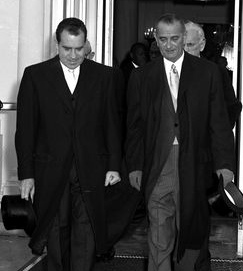Former Vice President Richard Nixon and Other Republicans Criticize President Johnson’s Vietnam Policies
November 4, 1966

Richard M. Nixon, former vice president under Dwight D. Eisenhower and a presidential hopeful, issues a statement criticizing President Johnson’s Vietnam policies. Specifically, Nixon—with the support of a cadre of prominent Republicans—decries a recent joint U.S.-South Vietnamese communiqué, which the administration sent to Hanoi, proposing an American withdrawal in exchange for a North Vietnamese withdrawal and a cessation of support for the Viet Cong insurgency. Nixon believes the proposal shows weakness to the Communists, and some hawks in Congress and elsewhere derisively label it as “surrender on the installment plan.” The proposal does not satisfy antiwar activists either, and they say it does not go far enough to end the war.
Nixon, along with other Republicans, has consistently criticized Johnson’s handling of the war, arguing he is not pushing hard enough to ensure victory. Nixon has the explicit support of former President Eisenhower in his statements. In separate October 1966 letters to Nixon, Eisenhower disparages opponents of the war and encourages Nixon to “keep hitting!” the Johnson administration for its “hesitation, indecision, and even timidity” in prosecuting the war.1